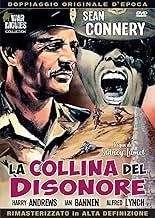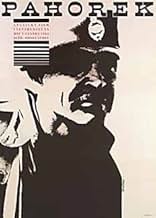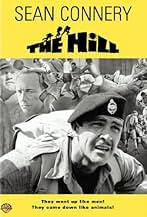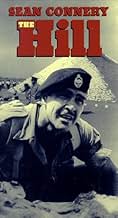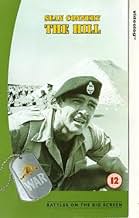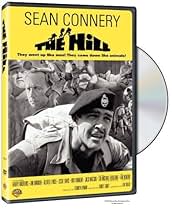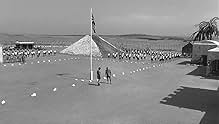In a North African military prison during World War II, five new prisoners struggle to survive in the face of brutal punishment and sadistic guards.In a North African military prison during World War II, five new prisoners struggle to survive in the face of brutal punishment and sadistic guards.In a North African military prison during World War II, five new prisoners struggle to survive in the face of brutal punishment and sadistic guards.
- Won 1 BAFTA Award
- 4 wins & 6 nominations total
Michael Redgrave
- The Medical Officer
- (as Sir Michael Redgrave)
Michael Hawkins
- Prisoner
- (uncredited)
James Payne
- Man in Prison
- (uncredited)
Robert Royal
- Prisoner
- (uncredited)
Harold Sanderson
- Officer
- (uncredited)
Featured reviews
Stark images, powerful script and performances, and rapid, sharp editing make this film difficult to forget. Director Sidney Lumet stamps his authority on the movie with a style that is gritty, almost documentary -like. The quick cuts are precise, like the snap of the salutes and the bark of the NCO's. Beyond Lumet's towering presence, there is a likeable performance from a young Ossie Davis, an excellent early non-Bond performance from Sean Connery, and Harry Andrews' Sargeant-Major is a remarkable creation - a little man whose job is to destroy these misfits on behalf of a system that will not tolerate individuals.
This remarkable film stays in the mind long after viewing for me, mainly because it announces early on that it is not an easy picture, and like early Frankenheimer, it's aggressive style stands out from the norm. It is a quintessential sixties picture - a time when experiments in style could be taken seriously - not just a smirky in-jokes or cartoonish roller -coaster rides. Exhilarating nonetheless.
This remarkable film stays in the mind long after viewing for me, mainly because it announces early on that it is not an easy picture, and like early Frankenheimer, it's aggressive style stands out from the norm. It is a quintessential sixties picture - a time when experiments in style could be taken seriously - not just a smirky in-jokes or cartoonish roller -coaster rides. Exhilarating nonetheless.
The Hill is a brutal film to watch. It stars a (relatively) young Sean Connery as he attempts to avoid being typecast as James Bond and features recognizable British actors in support. It's a psychological thriller set in a prison camp for court-martialed British soldiers, a rugged, terrifying camp run by a ruthless sergeant-major, played by Harry Andrews.
Connery is Joe Roberts, in the klink for slugging a superior officer after refusing to (re)enter the field of battle (his squad was hopelessly outnumbered and outflanked; see also Paths of Glory). Roberts is tossed in a cell with fellow cons George Stevens (Alfred Lynch), Jacko King (Ossie Davis), Monty Bartlett (Roy Kinnear), and Jock McGrath (Jack Watson), who alternately resent and respect Roberts' actions.
The hill of the title is a steep, sandy incline in the middle of the Sahara, where the camp's located. Convicts are tasked with double-timing it up one side and down the other, carrying a loaded backpack and their kit, or duffel bag. And then back again. The hill is used as a way for RSM Wilson (Andrews) to break them, to make them into real soldiers again.
Trouble arises when Wilson's second in command, Staff Sergeant Williams (Ian Hendry) badgers one of the convicts so relentlessly that the man dies, thus kicking the battle of wits between prisoner and gatekeeper to an entirely new level. And this is where we really begin to see the unvarnished war of man versus man, as Wilson and Williams strain to break not only Roberts but also his cellmates.
Connery is really fantastic as the strong-willed Roberts, and Wilson – who played plenty of authoritarian, stiff-backed British characters, is his equal. It's good to see Connery in a movie that transcends his sex appeal and his association with a certain superspy. Filmed in stark black and white (as black and white tends to be), The Hill is near the apex of psychological war films.
Connery is Joe Roberts, in the klink for slugging a superior officer after refusing to (re)enter the field of battle (his squad was hopelessly outnumbered and outflanked; see also Paths of Glory). Roberts is tossed in a cell with fellow cons George Stevens (Alfred Lynch), Jacko King (Ossie Davis), Monty Bartlett (Roy Kinnear), and Jock McGrath (Jack Watson), who alternately resent and respect Roberts' actions.
The hill of the title is a steep, sandy incline in the middle of the Sahara, where the camp's located. Convicts are tasked with double-timing it up one side and down the other, carrying a loaded backpack and their kit, or duffel bag. And then back again. The hill is used as a way for RSM Wilson (Andrews) to break them, to make them into real soldiers again.
Trouble arises when Wilson's second in command, Staff Sergeant Williams (Ian Hendry) badgers one of the convicts so relentlessly that the man dies, thus kicking the battle of wits between prisoner and gatekeeper to an entirely new level. And this is where we really begin to see the unvarnished war of man versus man, as Wilson and Williams strain to break not only Roberts but also his cellmates.
Connery is really fantastic as the strong-willed Roberts, and Wilson – who played plenty of authoritarian, stiff-backed British characters, is his equal. It's good to see Connery in a movie that transcends his sex appeal and his association with a certain superspy. Filmed in stark black and white (as black and white tends to be), The Hill is near the apex of psychological war films.
10DD-931
I can't think of a film less appreciated than this one. The tragedy of THE HILL began with its horribly botched release in 1965 - a textbook example of studio stupidity. On the other side of the equation, film purists who were worshipping at the alter of goofs like Godard's "Alphaville" turned up their noses at this movie because it starred the "lightweight" commercial actor Sean Connery. Jesus wept.
It is absolutely amazing that this movie is so uncompromisingly British while being directed by the so-called "New York" director Sidney Lumet. The man's a genius. And less you wonder, I lived for three years in England (1966-69) and am a World War II buff, so I have reason to testify to its authenticity. And for Sean Connery, at the height of his popularity (He was the Number One box office draw the year this movie came out), to play the character of SGT. Joe Roberts, sans toupee, and without the typical "movie star out" for his character - see the movie and compare it to THE LAST CASTLE, and you'll know what I mean - is nothing short of stunning.
Can you tell I love this movie? There's not a false moment in it. And the acting! Besides Connery, there are great performances by Harry Andrews, Ian Bannen, Ian Hendry, Ossie Davis...and oh yeah, every other person in the cast. Is it hard to understand the accents sometimes? Sure. But it's nothing that can't be overcome by simply paying attention when you watch this film.
And what does this movie say about the military mindset, the lust for power, racism, the duality of heroism and cowardice, the dangers of unquestioning loyalty, and more? A whole helluva lot more than 99% of the other movies - and theatrical plays - that you'll ever see.
I'll just finish by saying you are missing so much if you don't see this movie. You'll come out of it seeing things a little differently than you ever did before. And that's all you can possibly ask from a movie.
Come on, people. Let's get in the votes on THE HILL to get it into the IMDB Top 250 movie list. My vote: a 10.
It is absolutely amazing that this movie is so uncompromisingly British while being directed by the so-called "New York" director Sidney Lumet. The man's a genius. And less you wonder, I lived for three years in England (1966-69) and am a World War II buff, so I have reason to testify to its authenticity. And for Sean Connery, at the height of his popularity (He was the Number One box office draw the year this movie came out), to play the character of SGT. Joe Roberts, sans toupee, and without the typical "movie star out" for his character - see the movie and compare it to THE LAST CASTLE, and you'll know what I mean - is nothing short of stunning.
Can you tell I love this movie? There's not a false moment in it. And the acting! Besides Connery, there are great performances by Harry Andrews, Ian Bannen, Ian Hendry, Ossie Davis...and oh yeah, every other person in the cast. Is it hard to understand the accents sometimes? Sure. But it's nothing that can't be overcome by simply paying attention when you watch this film.
And what does this movie say about the military mindset, the lust for power, racism, the duality of heroism and cowardice, the dangers of unquestioning loyalty, and more? A whole helluva lot more than 99% of the other movies - and theatrical plays - that you'll ever see.
I'll just finish by saying you are missing so much if you don't see this movie. You'll come out of it seeing things a little differently than you ever did before. And that's all you can possibly ask from a movie.
Come on, people. Let's get in the votes on THE HILL to get it into the IMDB Top 250 movie list. My vote: a 10.
10tully-2
"The Hill" is the first of five films Sean Connery made with Sidney Lumet, and is one of the best, largely because it focuses on ensemble acting, and because each of the actors are up to the task.
The film is set in a North African prison camp during World War II, where a group of five inmates (Connery, Ossie Davis, Roy Kinnear, Alfred Lynch and Jack Watson) have just been assigned. The Sergeant-Major who runs things at the camp (Harry Andrews) has a novel theory about rehabilitation -- break down the wills of the inmates by repeatedly running them up and down a sandy hill built in the middle of the compound, then rebuild them as model soldiers. Despite the martinet-type attitude, Connery and each of his fellow inmates begins to rebel against Andrews and his new, sadistic assistant (Ian Hendry), culminating in the death of one of the inmates and the consequent attempt to cover up the incident.
In black-and-white, Lumet has done a remarkable job of giving the location the feel of hell-on-earth, and his noted ability to work with actors is visible here. Connery is excellent in the second-best performance of his career (the best was his 1973 performance in "The Offence", also with Lumet directing) as a career soldier whose not all that certain that the Army's outdated discipline is worth anything. Equally good performances are turned in by Davis as a West Indian soldier who takes the racist barbs of his jailers and rebels in his own, unique way; Watson as a brutish inmate who begins to develop a conscience; Ian Bannen as a sympathetic guard; Lynch as a sensitive man not meant for the army or jail; Andrews; and Michael Redgrave as the ineffectual doctor who finds courage at the crucial moment.
Probably the best performance, however, is turned in by Hendry as the deeply insecure, sadistic loose cannon of a guard who truly sets events in motion. At once, his performance is villanous, but with an edge of immaturity that makes it almost difficult to hate him -- until the end when the other characters really begin to appreciate just how dangerous he is.
Unfortunately, this film was ignored by the Oscars -- a tragedy especially from some actors who have/had generally been ignored by the Academy and other awards groups (i.e., Connery, Hendry, Andrews, Davis). It did, however, win an award at the Cannes Film Festival for Ray Rigby's superb screenplay.
You may need to listen close to pick up some of the dialogue, but by all means, see it if you get the chance.
The film is set in a North African prison camp during World War II, where a group of five inmates (Connery, Ossie Davis, Roy Kinnear, Alfred Lynch and Jack Watson) have just been assigned. The Sergeant-Major who runs things at the camp (Harry Andrews) has a novel theory about rehabilitation -- break down the wills of the inmates by repeatedly running them up and down a sandy hill built in the middle of the compound, then rebuild them as model soldiers. Despite the martinet-type attitude, Connery and each of his fellow inmates begins to rebel against Andrews and his new, sadistic assistant (Ian Hendry), culminating in the death of one of the inmates and the consequent attempt to cover up the incident.
In black-and-white, Lumet has done a remarkable job of giving the location the feel of hell-on-earth, and his noted ability to work with actors is visible here. Connery is excellent in the second-best performance of his career (the best was his 1973 performance in "The Offence", also with Lumet directing) as a career soldier whose not all that certain that the Army's outdated discipline is worth anything. Equally good performances are turned in by Davis as a West Indian soldier who takes the racist barbs of his jailers and rebels in his own, unique way; Watson as a brutish inmate who begins to develop a conscience; Ian Bannen as a sympathetic guard; Lynch as a sensitive man not meant for the army or jail; Andrews; and Michael Redgrave as the ineffectual doctor who finds courage at the crucial moment.
Probably the best performance, however, is turned in by Hendry as the deeply insecure, sadistic loose cannon of a guard who truly sets events in motion. At once, his performance is villanous, but with an edge of immaturity that makes it almost difficult to hate him -- until the end when the other characters really begin to appreciate just how dangerous he is.
Unfortunately, this film was ignored by the Oscars -- a tragedy especially from some actors who have/had generally been ignored by the Academy and other awards groups (i.e., Connery, Hendry, Andrews, Davis). It did, however, win an award at the Cannes Film Festival for Ray Rigby's superb screenplay.
You may need to listen close to pick up some of the dialogue, but by all means, see it if you get the chance.
This was one of the most poinant lines of the film, neatly summarising the general mood and feeling of the characters.
A lot of people think that this is an anti-war film, which to some degree it is. More accurately, however, it could be labelled an anti-army film. Interestingly enough both views could be maintained without there being any real warfare displayed on the screen. This is a measure of how powerful the film is.
The fighting which we see is actually between the various prison officers and convicts. The film does not simply divide them into opposing groups, but rather explores the differences and tensions between the people who are in power and those who are subject to it.
Like 'Full Metal Jacket', many years later, this movie is a condemnation of the dehumanising process soldiers are forced to go through in order to survive the army. Military prison, as we learn, is a further step down into the merciless and brutal world of the army.
If 'The Hill' was made today, the violence we see would undoubtedly be more explicit and obvious. However, this does not take away anything from the original , as it is the mental torture more than the physical suffering which is portrayed so well in Lumet's work.
It has aged fairly well, mainly due to the accomplished and original way the film is shot and the script is written. Camera angles to induce feelings of dominance, claustrophobia and pressure are utilised perfectly as are the varying degrees of light and dark contrast which accentuates the blazing sun. Every actor is well cast and gives well judged performances, most career bests. Those that stand out are Bannen, Hendry, Connery and Andrews.
At the core of the film is the struggle between Andrews and Bannen's respective characters for ultimate authority in the prison. The bittersweet ending shows that Andrews' charcter, although shaken, will still reign in the hellhouse of a military prison.
Superb, thought provoking film, that rewards the viewer for staying with it as the powerful ending is reached.
A lot of people think that this is an anti-war film, which to some degree it is. More accurately, however, it could be labelled an anti-army film. Interestingly enough both views could be maintained without there being any real warfare displayed on the screen. This is a measure of how powerful the film is.
The fighting which we see is actually between the various prison officers and convicts. The film does not simply divide them into opposing groups, but rather explores the differences and tensions between the people who are in power and those who are subject to it.
Like 'Full Metal Jacket', many years later, this movie is a condemnation of the dehumanising process soldiers are forced to go through in order to survive the army. Military prison, as we learn, is a further step down into the merciless and brutal world of the army.
If 'The Hill' was made today, the violence we see would undoubtedly be more explicit and obvious. However, this does not take away anything from the original , as it is the mental torture more than the physical suffering which is portrayed so well in Lumet's work.
It has aged fairly well, mainly due to the accomplished and original way the film is shot and the script is written. Camera angles to induce feelings of dominance, claustrophobia and pressure are utilised perfectly as are the varying degrees of light and dark contrast which accentuates the blazing sun. Every actor is well cast and gives well judged performances, most career bests. Those that stand out are Bannen, Hendry, Connery and Andrews.
At the core of the film is the struggle between Andrews and Bannen's respective characters for ultimate authority in the prison. The bittersweet ending shows that Andrews' charcter, although shaken, will still reign in the hellhouse of a military prison.
Superb, thought provoking film, that rewards the viewer for staying with it as the powerful ending is reached.
Did you know
- TriviaFilming took place in Almería, Spain in a sandy wasteland called Cabo de Gata starting in September 1964 for five weeks on location. An old Spanish fort in Málaga was used for the prison.
Many people associated with the production had regarded the filming as pleasant, despite difficult conditions---The temperatures rarely fell below 115 degrees Fahrenheit (46 degrees Celsius), and despite the 2,000 gallons of pure water that were shipped in for the crew, almost everyone succumbed to dysentery during the shoot.
- GoofsThe first time the new arrivals are shown around "the hill" by Staff Williams, the shadow of the rig is clearly visible as the camera performs a 360 degree shot from the top of the hill.
- Quotes
Trooper Joe Roberts: We're all doing time. Even the screws.
- Alternate versionsColorized version was broadcast over TNT Network June 7, 1989.
- ConnectionsFeatured in The Sun... the Sand... the Hill. (1965)
- How long is The Hill?Powered by Alexa
Details
Box office
- Budget
- $2,500,000 (estimated)
- Runtime2 hours 3 minutes
- Color
- Aspect ratio
- 1.85 : 1
Contribute to this page
Suggest an edit or add missing content


